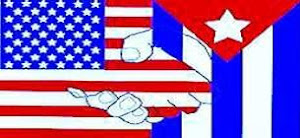The whole issue of Cuba appearing on the terror list has been the focus of recent news. We are going to examine this issue further in the next few blog posts, as it demonstrates both the illogic and the obstacle it is towards improving relations between our country and Cuba. The fundamental question we have to answer is - Do we -- the United States want improved relations with Cuba? Cuba must answer whether it wants improved relations with us. What are the specific conditions to improve relations? Where is there any agreement? We have to concretize where the common ground lies, and where the differences are in specifics. Keep in mind there are those interests who do not want any improvement in relations and are vested politically and economically in maintaining the status quo. But no one who chooses to overcome their own ignorance or arrogance on this subject would want the status quo to continue. Who would choose insanity? We are reprinting a good Opinion-Editorial from La Alborada with our thanks. This excellent op-ed does something that one should consider in properly analyzing and assessing a situation by applying inverse deduction and reasoning. How would we in the United States react and respond to the policies we are carrying out with Cuba if the situation were reversed?
.
Pop Quiz on Foreign Affairs La Alborada - January 8
.
Imagine the following scenario:
.
The US arrests in Washington a Cuban citizen who was granted a visa for religious activities. As it turns out, the suspect was distributing electronic communications equipment to certain people and groups in Washington known to be opponents of the government and close to the Cuban embassy. Investigation reveals that the suspect was a subcontractor of a Cuban company that in turn was operating under contract with Cuba's Ministry of Foreign Affairs.
.
The company, which implements Cuban government contracts in dozens of countries, declares to the media that all was above board and in the open. The subcontractor, company officers explain, was only helping members of the public in the US to communicate better among themselves and with unspecified affinity groups in Cuba. The contract at issue, worth millions of dollars, has the purpose of helping people in the US to build a real democracy, free from the domination of large banks and corporations defended by a repressive security apparatus. What's wrong with that?
.
The Cuban company's officers, media, and Ministry of Foreign Affairs profess not to understand why the US would want to arrest the subcontractor. Is the US government so touchy and insecure that it prohibits expert help in building freedom and democracy? Does it fear modern communications technology, and innocent assistance from well-intentioned agents of the Ministry?
.
Question: Upon consideration of the explanations of the Cuban corporation and the Ministry, what will the US government do?
.
a) Concede that it over-reacted, release the suspect, apologize for the arrest, and declare that it is glad to accept the assistance of agents of the Cuban company in implementing the expertise of the Ministry; or
b) Cite the danger to national security, deny bail and liberty on personal recognizance for the suspect, and bring charges of espionage and of conspiracy to overthrow the government.
.
Not a single one of you, dear readers, would choose option (a). In fact, you would probably give that option the chances of the proverbial snowball in Hell.
.
Now turn the situation around to meet the facts in the current matter of the US State department's agent (twice removed) who has been arrested in Cuba. What should Cuba's response be? It appears that for large parts of the US population, including the Executive Branch and most of Congress, and the media, the correct answer is, indeed, option (a): Cuba should back off and apologize.
.
Why the difference? In the end, because we are good and Cuba is bad. It's a simple argument.
.
But consider further that the US has a history of colonizing Cuba, intervening at will in its internal affairs, supporting two dictators and several corrupt presidents, invading the island, and pursuing a slew of terrorist schemes to overthrow the government.
What is more, it is required by current law to sabotage the economy of Cuba to the point of driving the people to insurrection, and it continues to fund and coordinate small groups in Cuba in order to undermine the government.
.
Now what is the correct answer? For the most part, it appears that the answer is still (a): Cuba should release the agent, apologize, and let bygones be bygones. Why? Because we are good and they are bad. It's that simple.
.
La Alborada is the newsletter of the Cuban American Alliance Education Fund (CAAEF), a national non-profit organization that advocates for better relations between the US and Cuba.










0 Comments:
Post a Comment